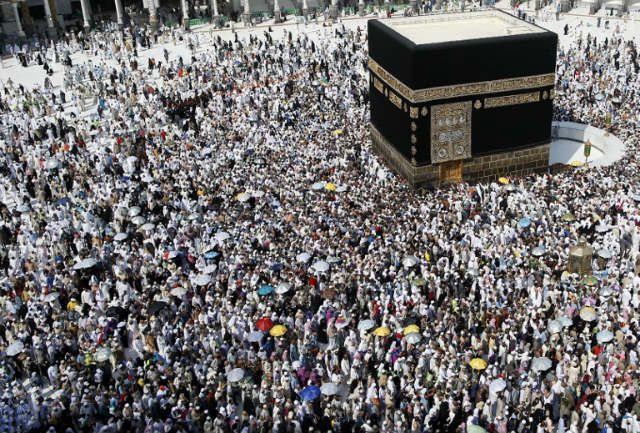SUMMARY
This is AI generated summarization, which may have errors. For context, always refer to the full article.

MANILA, Philippines – A long-time contractual employee of the Department of Foreign Affairs (DFA) is facing investigations over his alleged involvement in issuing fake Philippine travel documents to Muslim foreigners who want to make a pilgrimage to Mecca.
Khalid Ali Mapandi, who worked at the DFA passport division, used to be the agency’s “focal person” for Hajj passports, according to DFA Assistant Secretary Frank Cimafranca, head of the DFA’s Office of Consular Affairs (OCA).
Mapandi is being investigated by the National Bureau of Investigation (NBI) for his alleged involvement in the Hajj passport scam, Pasay City Prosecutor Benjamin Lanto said.
Lanto is expecting the NBI to soon submit a complaint against Mapandi, so that he can conduct a preliminary investigation and, if warranted, file a case in court.
He added that pilgrimage leaders, called sheikhs, face charges over the Hajj passport scam as well.
Within the DFA, too, Mapandi is set to face an internal investigation.
In an interview with Rappler, Cimafranca said the DFA also transferred Mapandi from the passport division to the OCA’s information section.
Rappler is still trying to reach Mapandi for comment as of posting time. We wrote Cimafranca’s office for help in reaching Mapandi on November 24. We also called the OCA’s Administrative Services Unit to reach Mapandi on November 25, and left a contact number with the office.
Mapandi’s name surfaced after Philippine authorities detained 177 Indonesian pilgrims for carrying fake Hajj passports from the Philippines.
The pilgrims had attempted to leave for Saudi Arabia on August 18, but because they couldn’t speak any Philippine language or dialect, immigration officials held their tickets and passports.
After this issue erupted, the DFA eventually stopped issuing Hajj passports as decided by the Cabinet.
Hajj passport 101
The Hajj is the required pilgrimage of Muslims to Mecca, the holiest place in Islam. Each adult Muslim is required to perform the Hajj at least once in his or her life.
Unfortunately, not all Filipino Muslims in Mindanao could perform the Hajj using regular passports, Cimafranca said.
This is because many of them, especially the elderly, lack birth certificates.
“If you are familiar with the places in Mindanao, the delivery of basic services in, for instance, remote municipalities in Basilan or Sulu, or even in Maguindanao, is very poor,” Cimafranca said in a mix of English and Filipino.
This was where the Hajj passports came in.
A Hajj passport was a special travel document issued to Filipino Muslim pilgrims who wanted to perform the Hajj, but could not produce documents such as a birth certificate.
‘Very restricted’ passport
When the DFA still issued this travel document, it was easier for Filipino Muslims to get a Hajj passport than a regular passport.
For example, those applying for a Hajj passport did not need to present a birth certificate, just a certificate of tribal affiliation from the National Commission on Muslim Filipinos (NCMF).
The certificate of tribal affiliation certifies that a person belongs to a certain tribe. (For regular passports, the DFA does not accept these documents in place of birth certificates, Cimafranca said.)
Cimafranca said a Hajj passport was also cheaper. If a regular passport, for instance, costs P500 ($10), a Hajj passport costs only P50 ($1).
“It was an accommodation given to our brother Muslims,” he said.

Cimafranca explained that the Philippines has been issuing Hajj passports since the late 1960s.
He said, however, that the phrase “Hajj passport” is a misnomer.
“It’s not a passport in the strict sense of the word, because a passport is a travel document that you can use for travel anywhere you want to go. But this Hajj passport is actually a special travel document,” he said.
The DFA official explained that the Hajj passport was “very restricted.”
He said it could only be used for one return journey to Saudi Arabia and only during the Hajj season, which falls on different dates each year, depending on sightings of the moon. The Hajj pilgrimage this year was scheduled from September 9 to 14.
Cimafranca added that a Hajj passport was valid only for a year. There was a time that it was valid only for 6 months.
“You cannot use it use it for any other purpose,” Cimafranca said.
How it was abused
How the Hajj passport was abused can be explained by the “law of supply and demand,” Cimafranca said.
He pointed out that Saudi Arabia can only admit a certain number of pilgrims to Mecca each year.
Up to two million Muslim pilgrims perform the Hajj annually.
Cimafranca said that if Saudi Arabia’s limit is two million pilgrims for a particular Hajj season, it will apportion two million slots to different countries “depending maybe on the population of the country.”
The Philippines, where Muslims comprise a minority, was allowed to send 8,000 pilgrims to Mecca this year.
Cimafranca said that by June 30 this year, however, the Philippines was able to fill up only around 4,000 out of 8,000 slots.
In contrast, he said Indonesia – with 205 million people or 88% of the population identifying as Muslims – easily runs out of slots in its Hajj quota.
Indonesia’s Hajj quota was 168,800. All the slots had been used up.
Given the Hajj quota system, Cimafranca said an Indonesian will have to wait for 15 to 20 years before getting a slot for the Hajj.
Cimafranca said: “If they learn, for example, that the Philippines has an excess in its quota, so you have a demand and you have a supply. There’s a demand from outside of the country, and there’s a supply that we have.”
“And the situation,” he said, “is being exploited by unscrupulous people and enterprising individuals. And these are usually the recruiters, called sheikhs,” he said.
Indonesians reportedly paid illegal travel agencies anywhere between $5,800 (P289,130)* to $9,900 (P493,515)*, an amount that covered fake Hajj passports.
Mapandi: DFA’s ‘liaison’ with NCMF
Cimafranca said the DFA is still looking into how exactly the Hajj passport scam was perpetrated. He said he does not want to preempt the investigation.
What he knew was that Mapandi was the DFA’s “liaison” with the NCMF.
“It’s his job to really ensure that the documents from the NCMF, brought by the applicants, are authentic,” he said.
Cimafranca added that Mapandi had “access” to officials from the NCMF.
Asked about the DFA’s possible shortcomings, he said that “the person who is supposed to appreciate the documents may have been negligent in processing it.”
He said the processor, for one, could have confirmed if the applicant is Filipino by speaking to him or her in local languages.
The problem, however, is if the applicant is Tausug, for example, and the interviewer is Maranao. “He can no longer communicate in the Tausug language because he is Maranao,” the DFA official said.
In other words, he said, the DFA lacks interviewers well versed in all languages used in Mindanao. “That is our deficiency,” he said.
He said this is why the DFA has “to really rely” on the NCMF for authentic documents.
Asked if the NCMF has shortcomings that led to the Hajj passport scam, Cimafranca said, “Malaki.” (A big one.)
This would not have happened, he said, if the NCMF did not issue faulty certificates of tribal affiliation.
Lanto said investigators have been waiting for Mapandi to explain his side. He said the NBI has subpoenaed Mapandi and has required him to submit an affidavit by December 4 or 5.
In the meantime, those who used fake Hajj passports remain, in the words of Indonesian Foreign Minister Retno Marsudi, as “victims of organized crime.”
Marsudi said: “I emphasize that the 177 pilgrims are victims. Once again, they are the victims.” – Rappler.com
We will update this story with Mapandi’s statement once it is available.
$1 = P49.85
Add a comment
How does this make you feel?
There are no comments yet. Add your comment to start the conversation.